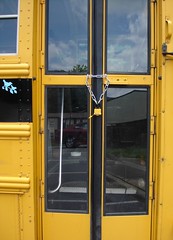Tony Attwood says, “An essential component of the interest is the accumulation and cataloguing of objects or the accumulation of facts and information about a specific topic.” To be “special,” an interest must also have one of the following: “Exclusion of other activities, repetitive adherence, [or] more rote than meaning.” (The Complete Guide to Asperger’s Syndrome, pp. 172-173)
When I was 5 and started kindergarten, I was fascinated by the school bus. I didn’t know why. Maybe it was going away from home by myself for the first time, easily an anxiety-inducing prospect. But somehow, the bus made the idea of plucking little children from their homes and sending them into the big, wide, chaotic world, an orderly, and even comforting thing.

Yellow is even a friendly color, don’t you think? Would the kiddies get on board a blue bus as eagerly? Or brown, or red? I think not.

The first thing that stuck in my mind about the bus was the door. I could not get over how the door worked. So cool! It would fold up onto itself, roll along a little track, and collapse against one side of the doorway, in a motion so smooth it seemed futuristic. Then it would reverse itself seamlessly back into place.

The bus driver controlled it with a little handle she would crank from one side to the other and then back. I would watch the door operate at each stop. Open, Close. Why couldn’t all doors be like that? The closest I could find was our fireplace doors at home. I used to play with them a lot. A thing of beauty.
Before long, I memorized the route of my bus and the order of the stops. I learned everybody’s name and had a mental picture of their house, even if I’d never spoken to them directly. At the time, I could recite the list in order, and probably in reverse, too.

I used to ride my bike down the street and pretend I was a school bus. I had a fixed route I would take, every day, forward and back. Up the driveway, cutting across the lawn behind the bushes, down the sidewalk. Every now and then, coming to a stop. Turning my front wheel to the right, as if it was the door opening, and picturing the invisible kid getting on or off. Always at precisely the same places. Until I got to the “school,” which I think was the sandbox. I may have even had names for the “streets” and the “students” in my head.

I didn't have to venture too far, either. I remember there was one stretch where I would actually ride down the same part of the street twice, but the first time it was a neighborhood street, and I would go slow, and the other time it was the interstate and I would go fast!

I’m not sure what the neighbors thought to see me dutifully performing this complex ritual, punctuated by stops and starts, day in and day out. To me, it was fun, something to feel responsible for and to lose myself in for a little while. I never shared my activity with anyone else; it wouldn’t have been the same. Sure, I would ride bikes with my friends, but that was riding bikes. This was driving my bus route.
I used to wonder why I did such a thing. Now that I’ve learned about special interests, I can see I was fascinated with order and routine, to the point of repetitive adherence. Neighbors might have seen a peculiar boy tracing a overly consistent path with his bike, but in my mind, there was grand purpose to every twist and turn. If I didn’t follow my route, “my kids” wouldn’t get to “school!” Just like the real bus driver who picked me up every day. She got me there and back, safe and sound. Out of chaos, order.
And so I breezed through the childhood milestone of starting kindergarten, not with trepidation, but with wide-eyed curiosity. My Asperger’s was an obstacle in other ways, but here, it was an asset. It allowed me, through the guise of an intense interest, to concoct a coping strategy for a life transition. Now that I’m older, I hope this approach continues to serve me well. Perhaps in the face of uncertainty, instead of reacting with fear, I could embrace life’s changes as if gazing through the window, with my nose pressed up against the glass.

Photo credits:
Flickr creative commons by ashe-villain
Google Maps












It's truly amazing how empowering it can be to know a little about how your own mind works! Suddenly, you can start to choose coping strategies that have worked well for you and develop new ones for those that have not. You are no longer at the mercy of what order exists in the world, you have order you can bring to the world.
ReplyDeletegreat insights, as usual!
ReplyDeleteThanks!
Delete